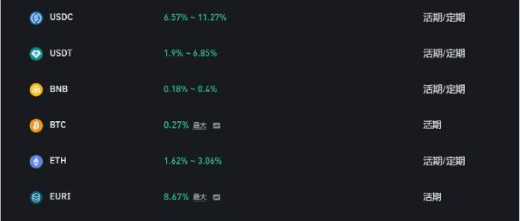
The easiest and most relaxed way to make money in cryptocurrency: Hold & Earn, you can earn just by holding. Most mainstream exchanges offer wealth management services, which can be commonly referred to as exchange wealth management CeFi, mostly based on flexible options, which can also be referred to as exchange flexible wealth management.
Wealth management on exchanges has two major advantages: it is very simple to operate and relatively safe (compared to complex on-chain operations), making it very suitable for beginners or those who prefer a hands-off approach.
What is cryptocurrency exchange wealth management? What are the risks?
Wealth management is one of the common services offered by cryptocurrency exchanges, allowing held cryptocurrencies to earn interest like deposits, helping us to make more money. The basic risk is the exchange going bankrupt, and more advanced structured wealth management may have additional asset risks.
Q: What is a cryptocurrency exchange?
A: A place to trade cryptocurrencies, similar to a securities exchange but for cryptocurrencies; to use an exchange, you need to register and open an account, and the cryptocurrencies held in your account are also custodied by the exchange.
Q: What is cryptocurrency exchange wealth management?
A: Cryptocurrencies held in an exchange account are idle when not traded, which means they cannot earn money, wasting capital efficiency. The exchange offers additional wealth management services that allow us to put idle assets to use and earn additional returns.
Q: What risks are associated with cryptocurrency exchanges?
A: Banks have deposit insurance, and stocks in securities exchanges are pooled and insured, all providing a certain degree of protection. However, assets in exchanges do not have deposit insurance; they are managed by the exchange. If the exchange is hacked, misappropriates funds, or manages poorly, our assets placed there may suffer losses.
Wealth management on exchanges can be further divided into three main categories; the most common is flexible/fixed wealth management, which is also the simplest.
Earning coins on-chain means the exchange helps you take the coins to earn on-chain. Unless it's a special cooperative event, due to the additional risks involved, if you want to earn on-chain, it's better to do it yourself rather than going through the exchange.
Structured wealth management adds options mechanisms, making it more speculative and not suitable for mindless wealth management options; it's not recommended for beginners.
Flexible/Fixed
Taking Bybit's interface as an example: Finance > Wealth Management > Bybit Savings, this includes both flexible and fixed wealth management products.
Find the currency, click to view the plan, and then stake it immediately; the operation is very simple and similar to online banking fixed deposits, without needing on-chain operations.
Key point: The returns for flexible and fixed wealth management are in the currency type; whatever currency you deposit will earn that same currency. Flexible can be redeemed at any time, while fixed may not be redeemable early or may incur interest loss if redeemed early.
Earning coins on-chain
Earning coins on-chain means that the exchange handles the coins for on-chain operations, earning on-chain returns. The exchange helps you put money on-chain, which comes with additional risks, including risks related to the chain and the protocol. Although the interface shows that it’s available for immediate redemption, on-chain redemption can sometimes have a waiting period. You can redeem at any time, but it may take several days or even weeks to be credited.
Unlike flexible wealth management, sometimes the coins deposited and the coins earned may differ based on on-chain activities. The on-chain portion is handled by the exchange, and the actual operation is very simple, just like flexible wealth management.
Structured Products
No matter which exchange, seeing the word 'structured' means it relates to options, which are not traditional financial products, but rather include futures and options mechanisms.
One of the characteristics of options is leverage and betting small for big returns. Although there is a risk of losing principal, there are also opportunities for additional profits, leaning more towards speculative strategies and not traditional wealth management.
Due to higher risks, it is advisable to first avoid trying until you understand the mechanisms, or to experience it with a small amount.
Wealth Management Guidelines for Exchanges
The return rate displayed on the interface is usually the APR (Annual Percentage Rate).
If you deposit for a whole year, you can receive this much; if the deposit term is less than a year, you will not receive such a high return rate.The return rate is variable
It's 10% now, but it may change to 8% tomorrow and then to 16% the day after, depending on market conditions.Returns are usually calculated per minute and distributed daily.
Don't worry about the fluctuating return rate; whatever it is at the moment is what will be calculated, distributed once a day. (Except for structured products, as each structured product has a different mechanism.)
Where do the returns from wealth management on exchanges come from? Is it a Ponzi scheme?
Wealth management on exchanges is not a Ponzi scheme; different types of wealth management have different sources of returns, summarized as follows:
Flexible wealth management - as a lending asset, it is lent to other users with funding needs, collecting interest as a return, suitable for investors who have coins on hand and want to earn steady returns.
On-chain wealth management - participate in on-chain staking to earn staking returns, or liquidity mining to earn liquidity returns, suitable for investors who want to pursue higher returns but do not want to operate on-chain themselves.
Structured wealth management - usually involves options operations, with returns coming from the financial mechanisms within, where 'time value' is key, suitable for investors who are more sensitive to price ranges.


